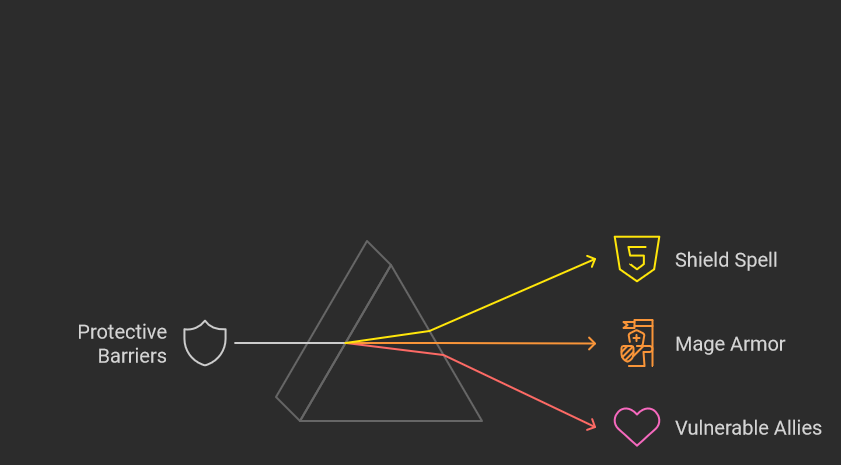Abjuration is a powerful and unique school of magic, commonly found in the world of fantasy role-playing games, especially Dungeons & Dragons (D&D). It is one of the core types of magic that focuses on defensive and protective abilities. Abjuration is essential for players and characters who want to protect themselves and others from harm, repel dangerous creatures, or nullify harmful magical effects. This school of magic plays a vital role in both gameplay strategy and character development, as it deals with creating magical shields, banishing enemies, and dispelling potent spells.
Understanding Abjuration Magic
Abjuration is one of the eight schools of magic, each with its own specialized focus. While other schools might concentrate on offense, illusion, or transformation, abjuration centers on defense and negation. Its core function is to protect, ward off threats, and cancel or counteract the magic of others. Abjuration spells often involve creating magical barriers, dismissing unwanted creatures, and dispelling harmful effects, making it indispensable for defending against both physical and magical dangers. This school empowers users to stand as magical guardians, using their abilities to keep themselves and their allies safe.

Key Elements of Abjuration Power
a. Protection
Abjuration magic excels at creating powerful protective barriers that shield individuals or groups from harm. These spells can guard against physical attacks, elemental forces, or other forms of magical assault. For instance, the Shield spell provides an immediate defense by increasing the target’s ability to deflect incoming attacks, while Mage Armor surrounds the caster in a magical force field, enhancing their resilience. These spells are crucial for defending vulnerable allies or reinforcing one’s own defenses in the heat of battle.
b. Banishment
One of the defining traits of abjuration magic is its ability to banish unwanted entities. Spells like Banishment are designed to send creatures from other planes of existence back to their home dimensions. This is particularly useful against extra-planar beings such as demons, elementals, or spirits, as it effectively removes them from the battlefield. Banishment can be a decisive move in encounters with such creatures, neutralizing threats by sending them far from the conflict.
c. Counterspelling and Dispel Magic
Abjuration also allows a spellcaster to negate or counteract the magic of others. With spells like Counterspell, a caster can interrupt and cancel another mage’s spell while it’s being cast, preventing the spell from taking effect. Similarly, Dispel Magic removes ongoing magical effects from objects, people, or locations. This power to nullify or remove magical effects makes abjuration an essential school of magic for combating enemy spellcasters or dismantling dangerous enchantments.
d. Warding
Warding spells are another hallmark of abjuration magic. These spells allow the caster to place protective enchantments over areas, objects, or people. For example, Alarm sets up an invisible sensor that alerts the caster when an intruder crosses a boundary, while Glyph of Warding stores a spell or an explosive effect to trigger when disturbed. Wards are versatile tools for securing locations, protecting valuable items, or laying magical traps.
e. Negating Harmful Effects
Abjuration is not only about preventing harm but also about undoing it. Spells like Remove Curse break magical curses, freeing their targets from debilitating effects. Lesser Restoration can heal conditions such as blindness, paralysis, or poison, making it a vital spell for restoring someone’s well-being. This ability to cleanse negative conditions ensures that abjuration remains useful beyond mere defense, providing essential support during and after combat.
Abjuration in Different Contexts
The term “abjuration” has a deeper, historical meaning beyond the realms of fantasy. It originates from the Latin word abjurare, meaning to “renounce” or “swear away.” Historically, abjuration referred to the formal renunciation of oaths, often used in religious or legal contexts. For example, individuals who converted from one religion to another might be required to abjure their previous faith. Similarly, in certain legal situations, a person might have been compelled to abjure allegiance to a nation or monarch.
In the magical context, abjuration retains this core idea of rejection—specifically the rejection of harmful forces, hostile magic, or unwanted entities. Just as someone might renounce an oath or allegiance in a legal or religious context, a mage uses abjuration to reject dangerous magic or banish malevolent creatures from their presence. This symbolic act of denial is what connects abjuration magic to its broader historical roots.

Real-World Applications of Abjuration Concepts
While abjuration is a fictional magic school in games like Dungeons & Dragons, its themes of protection, banishment, and defense against harm have parallels in real-world traditions. Many cultures throughout history have practiced forms of spiritual or physical protection through rituals, prayers, or talismans.
For example, in various religious traditions, people use prayers or incantations to protect themselves from evil spirits or negative energies. The use of holy water, salt, or protective symbols like the Christian cross or the Jewish mezuzah can be seen as real-world equivalents of abjuration spells. These objects and practices are believed to ward off harmful forces, much like magical wards in fantasy settings.
Similarly, in many cultures, exorcisms or purification rites are performed to banish evil spirits or cleanse a space of malevolent influences. These rituals closely mirror the abjuration magic of banishment, where unwanted entities are driven away from a person or location. Talismans, amulets, and protective charms worn for defense against misfortune also share a connection with the abjuration concept of shielding and warding.
Conclusion
Abjuration power is a vital aspect of fantasy magic systems, particularly in games like Dungeons & Dragons. Its primary function is to protect, banish, and nullify harmful forces, making it indispensable for defensive strategies in gameplay. Beyond its in-game applications, the concept of abjuration is rooted in historical and cultural practices of renunciation and protection, making it a fascinating bridge between fantasy and real-world traditions. Whether creating magical shields, banishing enemies, or dispelling harmful effects, abjuration serves as a powerful tool of defense and rejection in both fantasy worlds and metaphorical real-life contexts.
Abjuration Magic FAQ
1. What is Abjuration magic?
Abjuration magic is a school of magic that focuses on protective and defensive spells. These spells often create shields, wards, and barriers to protect the caster or others from harm, magical effects, or various dangers.
2. What are the key characteristics of Abjuration spells?
Abjuration spells are typically defensive, focusing on protection, banishment, and negation of other magical effects. They often involve creating magical barriers, dispelling harmful effects, or warding off evil forces.
3. How does Abjuration differ from other schools of magic?
Unlike evocation, which is offensive and deals with destructive forces, Abjuration is primarily defensive. Its spells do not focus on causing harm but rather on preventing harm or undoing harmful effects.
4. Can an Abjuration spell be used offensively?
While Abjuration is primarily defensive, some spells can indirectly harm enemies. For example, spells like Banishment or Counterspell can remove or neutralize enemies or their magic, acting as an indirect form of offense.
5. What are some well-known Abjuration spells?
Common Abjuration spells include Shield, Counterspell, Dispel Magic, Banishment, and Protection from Evil and Good. These spells are often used to protect allies or neutralize threats.
6. Can Abjuration magic prevent or negate curses?
Yes, some Abjuration spells can remove or negate curses. Spells like Remove Curse are specifically designed to break magical afflictions, including curses.
7. How do Abjuration wards work?
Wards are protective barriers created through Abjuration magic. They can prevent certain types of creatures, magical effects, or physical harm from crossing into a protected area. The strength and nature of the ward depend on the spell used.
8. Can an Abjuration spell be dispelled?
Yes, like other schools of magic, Abjuration spells can be dispelled or countered using appropriate spells like Dispel Magic or Counterspell, depending on the strength of the caster and the spell in question.
9. Who typically specializes in Abjuration magic?
In most fantasy settings, wizards and clerics often specialize in Abjuration magic. Wizards may focus on it to protect themselves and their allies, while clerics use it to defend against evil forces and protect the faithful.
10. What role does Abjuration magic play in group settings?
In group settings, Abjuration magic plays a vital role by protecting the party from incoming threats, magical effects, or physical attacks. It ensures the survival of the group by creating protective barriers and neutralizing enemy magic.
